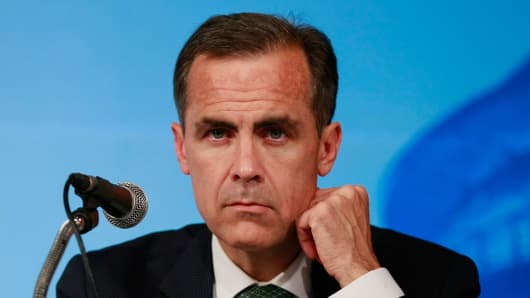The emigration of Mark Carney from Canada to the U.K. won't just lead to a lucky estate agent landing the fees on a 250,000 pounds ($406,000) a year rented house for the Carney brood.
Carney's generous relocation package and salary of nearly half a million pounds comes with a hefty inbox. While his predecessor Sir Mervyn King divided economists, he managed to help steer the U.K. through difficult waters without a total economic disaster.
Yet the Bank of England Carney inherits in July is uncertain of its next steps, and the U.K.'s economic outlook does not appear to be getting any better.
(Read More: Can Carney Deliver on Promise?)
Carney received the vote of approval from Jean-Claude Trichet, the former head of the European Central Bank, in an interview with CNBC.
Trichet said: "I know Mark very, very well. He's a very good professional and friend. I am sure he will have a hook up with all the issues that any central banker has to cope with so I have no advice to give and I am sure he will do the job very well."
These issues include a looming triple-dip recession and inflation which threatens to vault above the Bank's targets once more, squeezing U.K. consumers even further. The U.K. is expected to show slow or stagnant growth next year by most economists, and is facing the loss of its coveted triple-A credit rating.
(Read More: UK May Be OK to Lose AAA)
Abandoning the inflation target, which has been in place for two decades and is currently 2 percent,could be the first thing on his agenda. In a speech shortly after his appointment, Carney spoke about alternatives to the inflation target – and Chancellor of the Exchequer George Osborne, who fought hard to recruit Carney, has since indicated that the target is under review.
Carney will come under the magnifying glass again on February 7, when he appears in front of an influential committee of U.K. MPs to talk about monetary policy and – hopefully – his plans for the U.K.
Ditching the inflation target could mean replacing it with targets for the unemployment rate; GDP or domestically generated inflation. This could arguably mean that the Bank is focusing more on growth and unemployment, which can mean more to the man in the street than inflation.
Yet, as Spencer Dale, one of the members of the Bank's rate-setting committee and its chief economist, has argued, abandoning the inflation target is far from a "free lunch."
The Bank may also be left with long-term credibility issues if it abandons targets when they no longer suit.
"The switch of target might not persuade firms and households to spend more if they did not understand what the Bank was trying to achieve," Vicky Redwood, chief U.K. economist at Capital Economics, pointed out.
Another option available is the further loosening of monetary policy by increasing the Bank's asset purchase program yet again, although this may seem like more of the same.
Of course, if he passes the British citizenship test (his wife and children are already U.K. citizens) he could himself be awarded a knighthood, like most of his predecessors, in recognition of his service.
(Read More: Mark Carney's U.K. Citizenship Test)
His appointment enshrines the importance of Goldman Sachs asan incubator for key figures in the global economy. After his appointment, boththe ECB and the BoE will be run by Goldman alumni.
Trichet said: "We all have to cope with a situation which is abnormal, where markets are disrupted, where intermediation isn't functioning normally, where the deleveraging of the financial sector is proceeding with an amplitude which is considerable… That (what the central banks do) will progressively get us back to normal.
"It takes time and effort and also a lot of strong messages coming from the constituencies from central banks. I'm sure Mark will do it."
Written by Catherine Boyle, CNBC. Twitter:@cboylecnbc.



